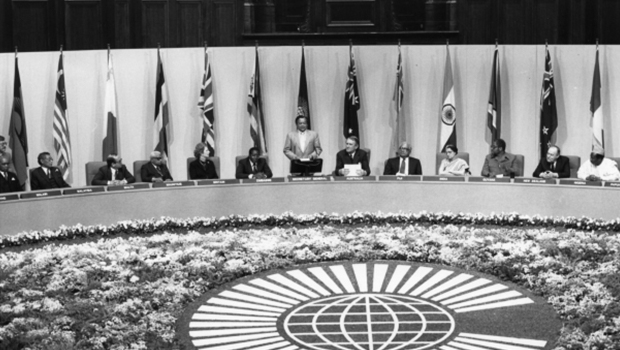Proclaimed desire to achieve equal rights for all citizens regardless of race, colour, sex, creed or political belief.
Image

Melbourne Declaration
Melbourne, Australia, 1981
We, the Heads of Government here assembled, drawn from five continents representing a quarter of the world ‘s entire population:
- Affirm our strong and unanimous conviction that all men and women have the right to live in ways that sustain and nourish human dignity;
- Believe that this right imposes obligations on all states, large and small, not only in respect to their own people but in their dealings with all other nations;
- Assert that the gross inequality of wealth and opportunity currently existing in the world, and the unbroken circle of poverty in which the lives of millions in developing countries are confined, are fundamental sources of tension and instability in the world;
- As a consequence, assert our unanimous conviction that there must be determined and dedicated action at national and international levels to reduce that inequality and to break that circle;
- Believe that for all these reasons it is imperative to revitalise the dialogue between developed and developing countries;
- Declare that this will require a political commitment, clear vision and intellectual realism which have thus far escaped mankind and to all of which the Commonwealth can greatly contribute;
- Believe that the dialogue must be conducted with a genuine willingness to accept real and significant changes commensurate with the urgency of the problems we now face;
- Firmly believe that the choice is not between change and no change but between timely, adequate, managed change and disruptive, involuntary change imposed by breakdown and conflict;
- Maintain that success will only be achieved as states recognise and give due weight to the essential inter-dependence of peoples and of states;
- Declare that, while the most urgent humanitarian considerations demand action, self-interest itself warrants a constructive and positive approach to these great human problems by all governments;
- Recognise that in the process of negotiations, nations must cast aside inhibitions and habits which have thwarted progress in the past and find new ways of talking constructively to one another so as to reach agreement on effective joint action;
- Note that, as well as technical economic considerations, it is imperative that states keep in the fore front of their attention the larger moral, political and strategic dimensions of what is at stake;
- Maintain that while the problems are formidable, they are not of such a weight that they will defeat our purpose, given political will and an understanding of the needs of different countries and groups;
- Assert that what is at stake-in terms of how hundreds of millions will live or die; of the prospects for co-operation or conflict; and of the prospects for economic advance or stagnation-is of such vital importance in human terms that it would be an indictment of this generation if that political will and the readiness to find a creative compromise were not found;
- Firmly believe that the issues are so important that they require the personal commitment and involvement of political leaders who, representing the will of their people, have the greatest power to advance the common cause of mankind;
- Attaching the highest importance to the principles and objectives of this document, recognising the mutual interests and interdependence of all nations, declare our common resolve: to end the present impasse: to advance the dialogue between developed and developing countries: to infuse an increased sense of urgency and direction into the resolution of these common problems of mankind : and solemnly call on all leaders of all countries to join us in a commitment to taking prompt , practical and effective action to that end.
Issued at the Commonwealth Heads of Government Meeting, Melbourne, Australia, 1981, 30 September – 7 October.
Document
The Melbourne Declaration
(41.72 KB)
Document
Commonwealth Declarations Booklet
(540.66 KB)



